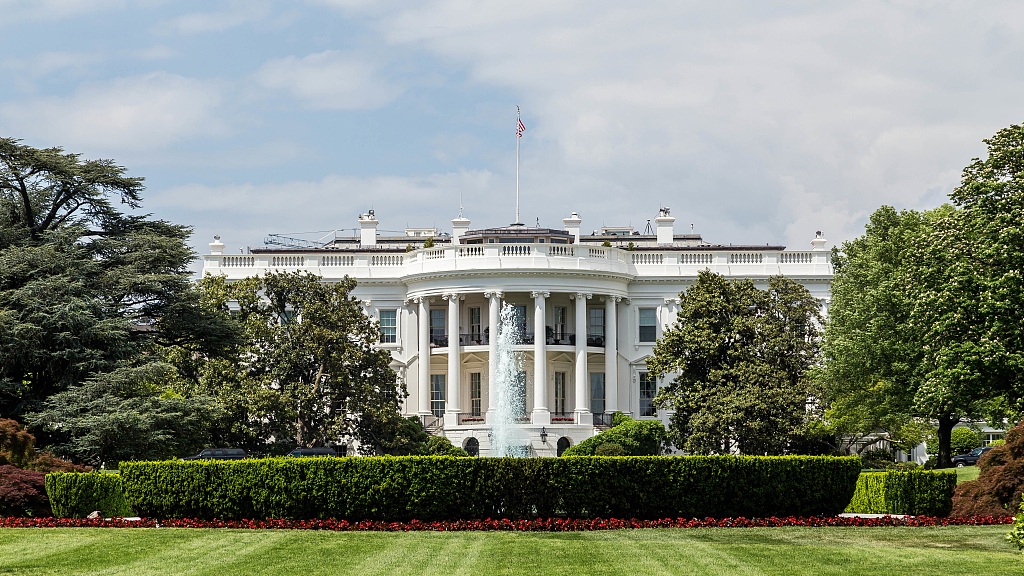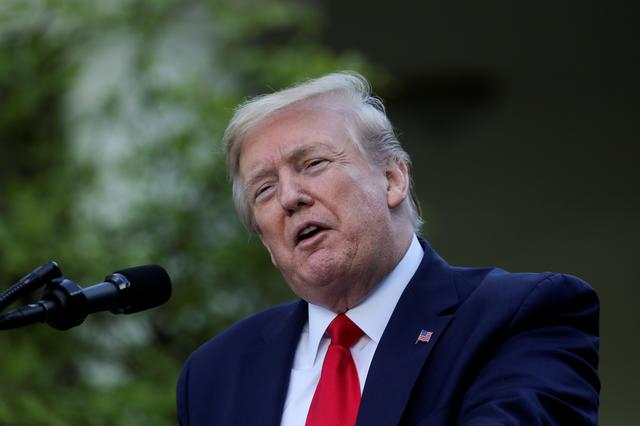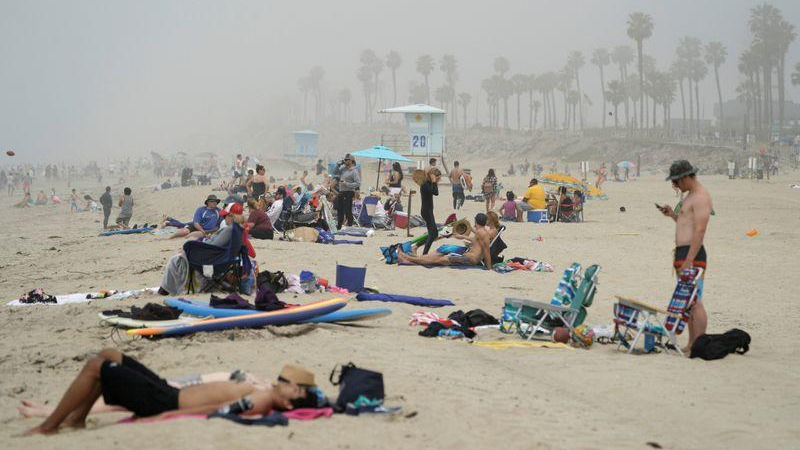01:58

U.S. President Donald Trump on Monday dismissed allegations by his opponent Joe Biden that he would try to delay the November election as the United States struggles to quell the coronavirus outbreak.
"I never even thought of changing the date of the election. Why would I do that? November 3," Trump told reporters at the White House.
"I look forward to that election, and that was just made-up propaganda. Not by him, but by some of the many people that are working" for Biden, Trump said.
The president cannot by law unilaterally change the date of the election, which is due on November 3.
"Mark my words, I think he is gonna try to kick back the election somehow, come up with some rationale why it can't be held," Biden said during an online fundraiser last week.

U.S. President Donald Trump addresses a coronavirus response news conference in the Rose Garden at the White House in Washington, U.S., April 27, 2020. /Reuters
U.S. President Donald Trump addresses a coronavirus response news conference in the Rose Garden at the White House in Washington, U.S., April 27, 2020. /Reuters
After skipping briefings at the weekend, the U.S. president began Monday's briefing by touting "encouraging signs of progress," including the number of new cases declining or being stable in various cities.
"We're seeing very little that we're going to look at as a superseding hotspot. Things are moving along," he said.
According to a tally by the John Hopkins University, the U.S. has reported 987,022 COVID-19 cases, and more than 56,000 people have died, representing more than a quarter of all deaths worldwide.
Asked about the increase in people improperly using disinfectants as a coronavirus treatment, Trump said: "I can't imagine why." And asked if he takes any responsibility for the spike, Trump answered: "No, I don't."
Last week, the U.S. president dangerously suggested scientists should explore whether inserting ultraviolet light or disinfectant into the bodies of people infected with the coronavirus might help them clear the disease.
'Very serious' investigations into China
Trump said the U.S. is probably heading to a death toll of 60,000-70,000. Americans died "for reason of incompetence" or some other reason, he said, before moving on to China.
He said China could have stopped the coronavirus before it swept the globe, and his administration was conducting "serious investigations" into what happened.
"We're doing very serious investigations ... We are not happy with China," Trump said. "We believe it could have been stopped at the source. It could have been stopped quickly and it wouldn't have spread all over the world."
This is the latest criticism from the Trump administration targeted at China's handling of the COVID-19 outbreak.
Last week, U.S. Secretary of State Mike Pompeo said the United States "strongly believed" Beijing failed to report the outbreak in a timely manner and covered up how dangerous the respiratory illness caused by the virus was.
China denies the accusations.
On Monday, Foreign Ministry spokeswoman Hua Chunying slammed Pompeo on Twitter, saying he should "stop playing the political game. Better save energy on saving lives."
China is a victim, not an initiator of the coronavirus disinformation, spokesman Geng Shuang told reporters at a daily briefing in Beijing.
"China always opposes the fabrication and spread of disinformation by any person or institution," Geng said on Monday, stressing the Chinese government has been "open, transparent and responsible" in its efforts to share information and experience with the world since the start of the outbreak.
China is also actively engaging in international cooperation to fight COVID-19 and providing assistance within its capacity to other countries, he added.
Kim Jong Un's condition
Trump also commented on the mysterious health condition of Kim Jong Un, leader of the Democratic People's Republic of Korea (DPRK).
He said he has a good idea of how Kim Jong Un is doing and hopes he is fine.
"I can't tell you exactly," Trump said when asked about Kim's condition at a White House news conference. "Yes, I do have a very good idea, but I can't talk about it now. I just wish him well."
"I hope he's fine. I do know how he's doing relatively speaking. We will see. You'll probably be hearing in the not-too-distant future," Trump said.

Alex Poam sells gloves on a street corner in Manhattan, New York, April 26, 2020. /AP
Alex Poam sells gloves on a street corner in Manhattan, New York, April 26, 2020. /AP

Huntington City Beach amid the COVID-19 outbreak, California, U.S., April 25, 2020. /Reuters
Huntington City Beach amid the COVID-19 outbreak, California, U.S., April 25, 2020. /Reuters
Shifting focus to economy
Meanwhile, the White House released new guidelines on coronavirus testing and reopening businesses.
As part of the guidelines effort, the U.S. Centers for Disease Control and Prevention released new priorities for virus testing, including people who show no symptoms but are in high-risk settings.
The White House unveiled what it described as a comprehensive overview of its efforts to make enough tests for COVID-19 available so states can sample at least 2.6 percent of their populations each month. Areas that have been hit harder by the virus would be able to test at double that rate, or higher, the White House said.
The Trump administration and medical experts outlined the plan on a call with governors Monday afternoon, and Trump announced that businesses such as CVS would expand access to tests across the country.
"Testing is not going to be a problem at all," Trump said later in the Rose Garden.
Monday's developments were meant to fill critical gaps in the White House plans to begin "reopening" the nation, ramping up testing for the virus while shifting the president's focus toward recovery from the economic collapse caused by the outbreak.
On the conference call with governors, Trump suggested that many states should consider reopening schools before the end of the academic year, easing the way for parents to go back to work.
"Some of you might start thinking about school openings because a lot of people are wanting to have the school openings," Trump told the governors.
Among Monday's announcements was a new "testing blueprint" for states. It includes a focus on surveillance testing as well as "rapid response" programs to isolate those who test positive and identify those with whom they came in contact with. The administration aims to have the market "flooded" with tests for the fall, when COVID-19 is expected to recur alongside the seasonal flu.
(With input from Reuters and AP)
(Cover: U.S. President Donald Trump addresses a coronavirus response news conference in the Rose Garden at the White House in Washington, U.S., April 27, 2020. /Reuters)